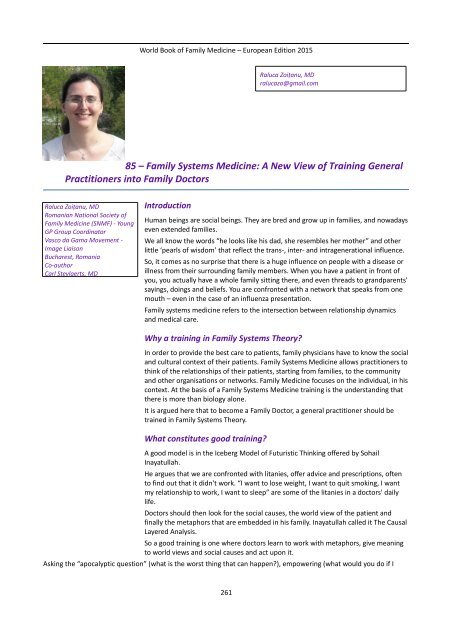Family Medicine
World Book 2015
World Book 2015
You also want an ePaper? Increase the reach of your titles
YUMPU automatically turns print PDFs into web optimized ePapers that Google loves.
World Book of <strong>Family</strong> <strong>Medicine</strong> – European Edition 2015<br />
Raluca Zoițanu, MD<br />
ralucazo@gmail.com<br />
85 – <strong>Family</strong> Systems <strong>Medicine</strong>: A New View of Training General<br />
Practitioners into <strong>Family</strong> Doctors<br />
Raluca Zoițanu, MD<br />
Romanian National Society of<br />
<strong>Family</strong> <strong>Medicine</strong> (SNMF) - Young<br />
GP Group Coordinator<br />
Vasco da Gama Movement -<br />
Image Liaison<br />
Bucharest, Romania<br />
Co-author<br />
Carl Steylaerts, MD<br />
Introduction<br />
Human beings are social beings. They are bred and grow up in families, and nowadays<br />
even extended families.<br />
We all know the words “he looks like his dad, she resembles her mother” and other<br />
little ‘pearls of wisdom’ that reflect the trans-, inter- and intragenerational influence.<br />
So, it comes as no surprise that there is a huge influence on people with a disease or<br />
illness from their surrounding family members. When you have a patient in front of<br />
you, you actually have a whole family sitting there, and even threads to grandparents'<br />
sayings, doings and beliefs. You are confronted with a network that speaks from one<br />
mouth – even in the case of an influenza presentation.<br />
<strong>Family</strong> systems medicine refers to the intersection between relationship dynamics<br />
and medical care.<br />
Why a training in <strong>Family</strong> Systems Theory?<br />
In order to provide the best care to patients, family physicians have to know the social<br />
and cultural context of their patients. <strong>Family</strong> Systems <strong>Medicine</strong> allows practitioners to<br />
think of the relationships of their patients, starting from families, to the community<br />
and other organisations or networks. <strong>Family</strong> <strong>Medicine</strong> focuses on the individual, in his<br />
context. At the basis of a <strong>Family</strong> Systems <strong>Medicine</strong> training is the understanding that<br />
there is more than biology alone.<br />
It is argued here that to become a <strong>Family</strong> Doctor, a general practitioner should be<br />
trained in <strong>Family</strong> Systems Theory.<br />
What constitutes good training?<br />
A good model is in the Iceberg Model of Futuristic Thinking offered by Sohail<br />
Inayatullah.<br />
He argues that we are confronted with litanies, offer advice and prescriptions, often<br />
to find out that it didn't work. “I want to lose weight, I want to quit smoking, I want<br />
my relationship to work, I want to sleep” are some of the litanies in a doctors' daily<br />
life.<br />
Doctors should then look for the social causes, the world view of the patient and<br />
finally the metaphors that are embedded in his family. Inayatullah called it The Causal<br />
Layered Analysis.<br />
So a good training is one where doctors learn to work with metaphors, give meaning<br />
to world views and social causes and act upon it.<br />
Asking the “apocalyptic question” (what is the worst thing that can happen?), empowering (what would you do if I<br />
261


